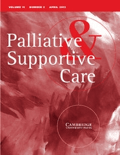
Palliative & Supportive Care
Scope & Guideline
Transforming Challenges into Care Solutions
Introduction
Aims and Scopes
- Interdisciplinary approaches to palliative care:
The journal emphasizes research that integrates various disciplines such as medicine, psychology, social work, and spiritual care, reflecting the holistic nature of palliative care. - Patient and caregiver experiences:
A significant focus is placed on understanding the lived experiences of patients and caregivers, including their emotional, psychological, and social challenges during the course of serious illnesses. - Cultural and ethical considerations:
The journal addresses how cultural contexts and ethical dilemmas impact palliative care practices, aiming to promote culturally sensitive approaches. - Innovative therapeutic interventions:
Research on new therapeutic modalities, including psychological, pharmacological, and alternative therapies, is a key area, with a focus on their effectiveness in managing symptoms and improving quality of life. - Education and training in palliative care:
The journal highlights the importance of education and training for healthcare providers, aiming to improve competencies in delivering high-quality palliative care. - Policy and advocacy in palliative care:
Research that informs policy changes and advocates for the rights of patients receiving palliative care is also a core component, aiming to influence healthcare systems positively.
Trending and Emerging
- Psychosocial and emotional support:
There is an increasing emphasis on the psychological and emotional well-being of both patients and caregivers, with research exploring interventions that address mental health needs. - Integration of spirituality in care:
Emerging studies focus on the integration of spiritual care within palliative practices, recognizing its significance in enhancing quality of life for patients with serious illnesses. - Telehealth and digital interventions:
The COVID-19 pandemic has accelerated interest in telehealth and digital solutions for delivering palliative care, including virtual consultations and remote support systems. - Cultural competence and diversity:
Research is increasingly highlighting the need for cultural competence in palliative care, addressing the diverse needs of populations and advocating for tailored approaches. - Interprofessional collaboration:
There is a growing trend towards interdisciplinary collaboration in palliative care, with research focusing on the roles of various healthcare professionals working together to improve patient outcomes. - Advance care planning and decision-making:
Emerging themes include the importance of advance care planning and shared decision-making processes, particularly in complex healthcare environments.
Declining or Waning
- Traditional medical models of care:
There is a noticeable decrease in research emphasizing purely traditional medical approaches to end-of-life care, as the field increasingly embraces holistic and patient-centered models. - Single-disease focus:
Research papers that concentrate solely on specific diseases without considering the broader context of palliative care are becoming less common, indicating a shift towards more integrative and comprehensive care approaches. - Static palliative care protocols:
There is a waning interest in rigid, non-adaptive palliative care protocols that do not account for individual patient needs or preferences, as the focus shifts towards personalized care. - Exclusively quantitative studies:
The journal has seen a decline in purely quantitative studies that lack qualitative insights, as the value of understanding patient narratives and experiences gains prominence. - Limited engagement with community resources:
Research that does not explore the role of community resources and support systems in palliative care is becoming less prevalent, reflecting a growing recognition of the importance of community involvement.
Similar Journals
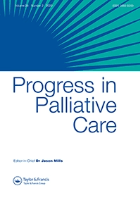
PROGRESS IN PALLIATIVE CARE
Advancing compassionate care for life-limiting illnesses.PROGRESS IN PALLIATIVE CARE, published by ROUTLEDGE JOURNALS, TAYLOR & FRANCIS LTD, is a leading academic journal dedicated to advancing the field of palliative care through high-quality research and innovative practices. With an ISSN of 0969-9260 and an E-ISSN of 1743-291X, this journal serves as a critical resource for healthcare professionals, researchers, and students seeking to enhance their understanding of pain management, symptom relief, and holistic care approaches for patients with life-limiting illnesses. Operating without an open access model, the journal is well-regarded in the academic community, holding a Q3 ranking in Medicine (miscellaneous) and a Q2 ranking in Nursing (miscellaneous) as of 2023. Its Scopus ranking places it at rank #51 out of 139 in General Nursing, reflecting its relevance and quality within the field. Covering the period from 2001 to 2024, it aims to foster interdisciplinary dialogue and share vital research findings to improve palliative care practices, ultimately enhancing patient care and outcomes.
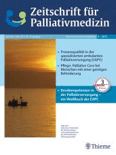
Zeitschrift fur Palliativmedizin
Enhancing quality of life through dedicated palliative insights.Zeitschrift für Palliativmedizin, published by GEORG THIEME VERLAG KG, is a leading journal dedicated to the field of palliative medicine. With its focus on improving the quality of life for patients with severe illnesses, this journal serves as an essential platform for researchers, healthcare professionals, and students interested in the latest developments, practices, and innovations in palliative care. While it does not currently offer open access options, Zeitschrift für Palliativmedizin is committed to disseminating high-quality, peer-reviewed research that advances the understanding and implementation of palliative care strategies. Situated in Stuttgart, Germany, this journal aims to bridge the gap between clinical practice and research, facilitating the exchange of knowledge that enhances patient care and support. As the field continues to grow in importance, this journal stands out as an invaluable resource for those dedicated to improving patient outcomes and advancing the discourse in palliative medicine.

Journal of Adolescent and Young Adult Oncology
Pioneering Research for a Brighter Future in OncologyThe Journal of Adolescent and Young Adult Oncology, published by MARY ANN LIEBERT, INC, is a premier peer-reviewed journal dedicated to enhancing the understanding and treatment of cancers in adolescents and young adults. With an ISSN of 2156-5333 and an E-ISSN of 2156-535X, this journal specializes in providing vital insights into the unique challenges faced by younger cancer patients, promoting research and clinical best practices in this underrepresented population. The journal features a commendable ranking in the Q2 quartile for Oncology and Q1 quartile for Pediatrics, Perinatology, and Child Health—highlighting its impact and relevance in both fields. Its Scopus rankings also reflect a strong standing; positioned at Rank #107/330 in Pediatrics and Rank #225/404 in Oncology. While the journal operates under a subscription-based model, it aims to disseminate crucial research findings and innovative treatments through its engaging content that serves as an invaluable resource for researchers, clinicians, and students alike. Since its inception in 2014, the journal has been at the forefront of addressing the pressing issues pertinent to young cancer patients, making it a vital outlet for groundbreaking studies and clinical advancements within this critical area of healthcare.
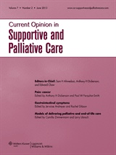
Current Opinion in Supportive and Palliative Care
Shaping the future of care through cutting-edge research.Current Opinion in Supportive and Palliative Care, an esteemed journal published by Lippincott Williams & Wilkins, provides a vital platform for the dissemination of contemporary research and expert perspectives in the fields of supportive and palliative care. As part of the medical community's growing focus on critical care and oncology, this journal has earned its place in the Q2 category across multiple rankings, reflecting its influence and significance in advancing knowledge and practices. With its ISSN 1751-4258 and E-ISSN 1751-4266, it covers literature from 2007 to 2024, making it a reliable resource for the latest developments. While it does not offer open access, the journal ensures careful curating of high-quality articles, fostering a deeper understanding of complex care needs. Researchers, clinicians, and students alike will benefit from the journal's insights, exploring innovative strategies and multidisciplinary approaches to improve patient outcomes in critical situations. The commitment to such a crucial area of healthcare underscores the importance of this publication in shaping future practices and policies.
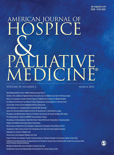
American Journal of Hospice & Palliative Medicine
Transforming the landscape of hospice care through evidence-based research.The American Journal of Hospice & Palliative Medicine, published by SAGE Publications Inc, is a leading peer-reviewed journal dedicated to advancing the field of hospice and palliative medicine. With its ISSN 1049-9091 and E-ISSN 1938-2715, the journal has been a vital resource since its inception in 1984, aiming to provide comprehensive insights into clinical practices, innovations, and research findings that enrich the quality of life for patients with serious illnesses. It holds a prestigious position as a Q2 journal in the field of medicine (miscellaneous), ranked #139 out of 636 in General Medicine with an impressive 78th percentile standing according to Scopus. The journal does not currently operate under an Open Access model, ensuring rigorous review and quality control of its content. Researchers, clinicians, and students are encouraged to engage with the latest developments and evidence-based practices in palliative care as the journal continues to shape discussions and policies in this critical area of healthcare.
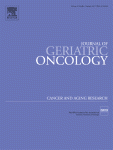
Journal of Geriatric Oncology
Enhancing quality of life for elderly cancer survivors.Journal of Geriatric Oncology, published by Elsevier, stands at the intersection of geriatric medicine and oncology, addressing the unique needs and challenges of cancer management in older adults. Since its inception in 2010, this esteemed journal has played a pivotal role in advancing research and clinical practices, aiming to improve the quality of life and treatment outcomes for elderly cancer patients. With its impressive categorization in the 2023 Q2 quartile for both Geriatrics and Gerontology and Oncology, the journal demonstrates a noteworthy impact within its fields, ranking #153 out of 404 in Medicine – Oncology and #45 out of 116 in Medicine – Geriatrics and Gerontology. Researchers and healthcare professionals are encouraged to access critical insights through its rigorous peer-reviewed articles, which offer cutting-edge research findings and clinical applications. As the field continues to evolve, the Journal of Geriatric Oncology remains a vital resource for those dedicated to fostering innovation in geriatric oncology.
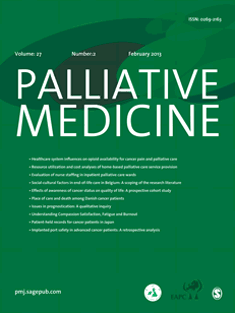
PALLIATIVE MEDICINE
Advancing the Art of Compassionate CarePalliative Medicine is a premier journal dedicated to advancing the field of palliative care, published by SAGE Publications Ltd. Established in 1987 and continuing through 2024, this esteemed journal focuses on the integration of pain management and comprehensive care for patients with life-limiting illnesses. With its impressive impact factor and a prestigious Q1 ranking in both Anesthesiology and Pain Medicine, as well as in Medicine (miscellaneous), it stands as a critical resource for researchers, healthcare professionals, and students engaged in this vital area of medicine. The journal emphasizes original research, reviews, and clinical studies that contribute to the understanding and practice of palliative care, promoting improved quality of life and support for patients and their families. Although not open access, articles are accessible through institutional subscriptions, ensuring the dissemination of knowledge to a wide audience. Whether you are a seasoned researcher or an emerging professional in the field, Palliative Medicine remains an invaluable platform for scholarly exchange and innovation.

Journal of Hospice & Palliative Nursing
Advancing Compassionate Nursing Practices.The Journal of Hospice & Palliative Nursing (ISSN: 1522-2179, E-ISSN: 1539-0705), published by Lippincott Williams & Wilkins, stands as a leading resource in the field of hospice and palliative care nursing. With an impressive impact factor and ranked in the Q1 quartile for Advanced and Specialized Nursing and Q2 quartile for Community and Home Care as of 2023, this journal serves as a critical platform for disseminating evidence-based practices and innovative research. It covers a broad spectrum of topics, aiming to improve patient experiences and enhance the quality of care for individuals with life-limiting conditions. Created to support healthcare professionals, researchers, and students in the United States and beyond, the journal invites contributions that stimulate scholarly dialogue and advance the practice of palliative nursing. With publication years converging from 1999 to 2024, it remains an invaluable asset to the nursing community, fostering advancements in this vital area of healthcare.
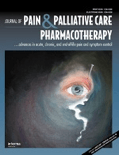
JOURNAL OF PAIN & PALLIATIVE CARE PHARMACOTHERAPY
Shaping the Future of Pharmacotherapy in Pain and Palliative Care.JOURNAL OF PAIN & PALLIATIVE CARE PHARMACOTHERAPY, published by Taylor & Francis Inc, is a vital resource for professionals in the fields of anesthesiology, pain medicine, and pharmacology. With an ISSN of 1536-0288 and an E-ISSN of 1536-0539, this esteemed journal has been providing a platform for innovative research and critical reviews since its inception in 2002, and it will continue to contribute to scientific discourse until 2024. Holding a Q2 ranking in Anesthesiology and Pain Medicine and a Q3 ranking in Medical Pharmacology, the journal is positioned to deliver high-impact articles that explore advancements in pain management and palliative care strategies. While not an Open Access journal, it offers significant subscription-based access to its curated content, ensuring that researchers and practitioners have the opportunity to stay updated on the latest trends and findings in pain therapy. Furthermore, with its Scopus rankings reflecting ongoing relevance and a robust academic community, this journal is essential for those aiming to deepen their understanding of pain management pharmacotherapy.
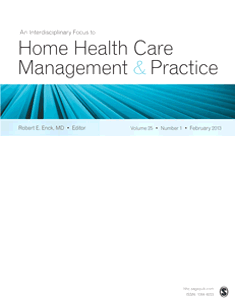
Home Health Care Management and Practice
Exploring Innovations in Home Health ServicesHome Health Care Management and Practice, published by SAGE Publications Inc., is an esteemed journal dedicated to advancing the field of home health care management through rigorous research and thought-provoking commentary. Established in 1988, this scholarly publication has become a critical resource for professionals, researchers, and students interested in the dynamics of community care and home health services. With an impact that reflects its commitment to quality, the journal holds an impressive standing, achieving a Q2 ranking in Community and Home Care and a Q3 ranking in both Leadership and Management and Public Health, as of 2023. The journal operates without open access, ensuring that its contributions are housed within an esteemed academic framework. Covering key areas such as nursing, leadership strategies, and occupational health, it serves as an essential platform for disseminating knowledge, fostering collaboration, and influencing best practices in the field. The journal's targeted focus empowers its readers to stay at the forefront of emerging trends and evidence-based practices, making it a vital asset for anyone involved in the evolving landscape of home health care.